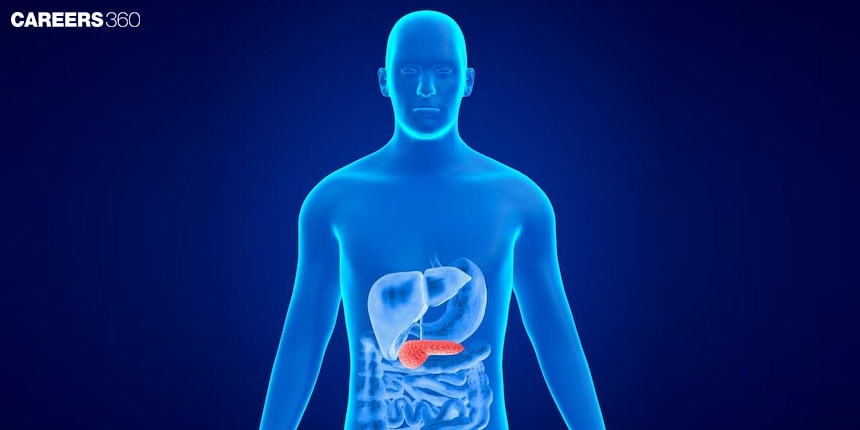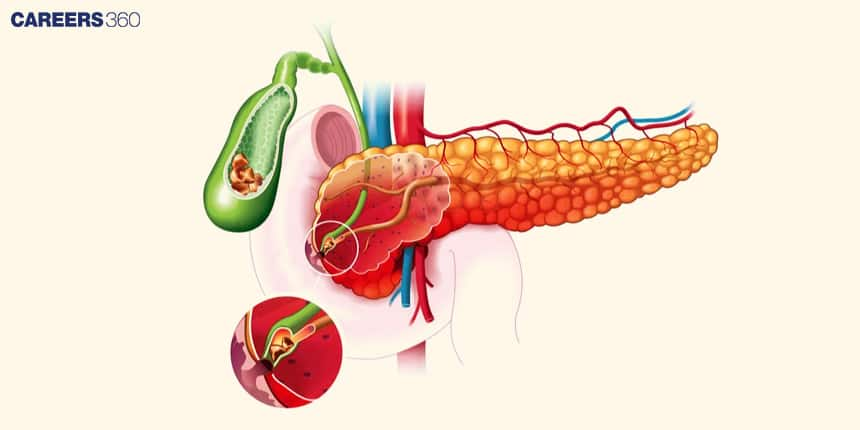Pancreas Function in Human Body: Roles with Detailed Explanation
The pancreas is an important organ in the human body that helps with digestion and controls blood sugar levels. It is located behind the stomach and produces digestive enzymes that help break down food in the small intestine. The pancreas also makes hormones like insulin and glucagon, which control how much sugar is in the blood. This topic is from class 11 chapter Chemical Coordination and Integration in Biology.
NEET 2025: Mock Test Series | Syllabus | High Scoring Topics | PYQs
NEET Important PYQ's Subject wise: Physics | Chemistry | Biology
New: Meet Careers360 B.Tech/NEET Experts in your City | Book your Seat now
- Pancreas
- Pancreas Function – Location of Pancreas
- Pancreas Function – Structure of Pancreas
- Pancreas Function in the Digestive System
- Disorders of the Pancreas
- Recommended Video on Pancreas Functions in the Human Body

Pancreas
The pancreas is an exocrine gland located in the abdomen, having two roles: in the digestive system and as an endocrine organ. Knowing its functions is of principal interest for grasping how the body deals with digestion and maintains blood sugar levels within the organism.
Pancreas Function – Location of Pancreas
The pancreas is situated in the upper abdomen, projecting behind the stomach and horizontally across the back of the abdomen. It lies between the duodenum, which forms the first part of the small intestine, and the spleen. The head projects near the duodenum, the body crosses laterally across the abdomen, while the tail extends toward the spleen. In this position, it supports digestion and helps regulate hormones.
Also Read:
- Practice MCQ on the Pancreas
- Chemical Coordination and Integration
- Endocrine Glands and Hormones
- Digestion and Absorption
Pancreas Function – Structure of Pancreas
The pancreas is an important organ placed behind the stomach and it performs the most vital role in both the exocrine as well as the endocrine system.
Anatomy of Pancreas
Body Shape and Location: The Pancreas is a long, flat, and irregularly shaped organ approximately six inches long. It is placed in the upper abdomen on the back side of the stomach, extending from the duodenum to the spleen.
Pancreas Parts
Head: The wide part near the duodenum which is the first section of the small intestine.
Body: This is the middle portion, extending horizontally along the abdomen.
Tail: It reaches on to the spleen as the narrow part

Pancreas Function in the Digestive System
The pancreas is an elongated, thin gland behind the stomach and across the abdomen. It has two major regions:
Exocrine Function
The exocrine pancreas plays a significant role in the digestive process by producing and secreting pancreatic juice that contains the following digestive enzymes:
- Amylase: breaks down carbohydrates into simple sugars.
- Proteases: including trypsin or chymotrypsin, break down proteins into peptides and amino acids.
- Lipases: Break down fats into fatty acids and glycerol.
It is then secreted into the small intestine through the pancreatic duct and plays its role in the digestion and absorption of food.
Endocrine Function
The endocrine pancreas controls the levels of sugar in the blood by releasing hormones into the bloodstream via the islets of Langerhans:
Insulin
This hormone, produced by beta cells of the pancreas, decreases blood glucose levels by increasing fluxes of glucose into cells for use in energy production or storage as glycogen.
Glucagon
This hormone, produced by the alpha cells, has the opposite effect; that is, it increases blood sugar levels by stimulating the release of glucose in storage into general circulation from the liver.
Somatostatin
This hormone is produced by delta cells and acts to modulate the relative secretion of insulin versus glucagon and to inhibit growth hormone secretion.
Control of Blood Sugar Level
Insulin and glucagon are balanced in the pancreas to maintain blood glucose homeostasis. Following a meal, blood glucose levels rise. The pancreas then releases insulin into the bloodstream. Insulin promotes the uptake of glucose by cells, removing sugar from the blood. Once the blood glucose has dropped too low, the pancreas releases glucagon which stimulates the liver to manufacture and secrete more glucose into the blood, thus returning blood glucose levels to normal.
Disorders of the Pancreas
Dysfunction of the pancreas can give rise to several disorders.
Diabetes Mellitus: In this case, there is an absolute lack of insulin to be secreted, Type 1 Diabetes, or the body resists the action of insulin, Type 2 Diabetes, thus keeping blood sugar levels high over some time.
Pancreatitis: This is a situation in which the organ, the pancreas, gets inflamed. It could be acute or chronic and results mostly from alcohol abuse and gallstones. This may impair both exocrine and endocrine functions.
Pancreatic Cancer: It is a malignant growth in the pancreas capable of interfering with the ability of the pancreas to produce the required amount of hormones and digestive enzymes.
Also Read:
Recommended Video on Pancreas Functions in the Human Body
Frequently Asked Questions (FAQs)
The pancreas acts both as an exocrine organ, in that it produces secretions, including digestive enzymes, and as an endocrine organ, having hormone products that regulate sugar levels in the blood.
Common diseases of the pancreas include pancreatitis, or inflammation, and cancer of this organ, with differential aetiologies and symptom manifestations.
Digestion is supported by pancreatic secretions that include enzymes breaking down carbohydrates, fats, and proteins into absorbable-sized molecules in the intestines.
The pancreas produces many hormones, such as insulin, both crucial for maintaining stable blood glucose concentrations.
Some of the risk factors for pancreatic cancer include smoking, family history of pancreatic cancer, and some genetic conditions.
Also Read
30 Nov'24 03:25 PM
26 Nov'24 05:38 PM
25 Nov'24 06:43 PM
25 Nov'24 05:45 PM
25 Nov'24 04:48 PM
25 Nov'24 03:52 PM
23 Nov'24 04:30 PM
23 Nov'24 10:03 AM

